Greece and Cyprus: the success story of the Eastern Mediterranean, says Endy Zemenides
Endy Zemenides is always enthusiastic—but he’s particularly enthusiastic now because of the progress he sees both Greece and Cyprus have made in weathering their crises and only emerging stronger. “If somebody told you in 2015 that Greece was gonna be leading the Euro zone in growth, after a second economic crisis, and after coronavirus hit in 2020 –you would have been laughed at,” says Zemenides, the executive director of the Hellenic American Leadership Council (HALC), a “think-and-do tank,” as he calls it, based in Chicago and Washington DC.
And even as a Cypriot refugee himself (he was a kid when he had to flee the island), he sees the island’s growing stature with hope. “Cyprus is playing a role in the European Union,” he says. “Cyprus is playing a role in the Trilaterals that Greece has with Israel, Egypt, Jordan. Cyprus is a founding member of the East Med Gas Forum. I’ve always said to American officials, work on the bilateral relationship with Cyprus, and good things can come from there. If Turkey knows Cyprus is going to keep moving ahead while it’s being left behind, they’re going to be more incentivized to make a deal.”
A longtime Chicagoan, Endy (Auxentios) Zemenides practiced law in the city, but got interested in politics early and became a senior advisor to Illinois State Treasurer and U.S. senate candidate Alexi Giannoulias. And with a background in international law and politics (he studied human rights at the University of Essex and got a doctorate from Georgetown U. Law School and was a fellow of its Harrison Policy Institute), he was a natural fit to lead the HALC when it was founded in 2012 by cosmetics tycoon, the late Nikos Mouyiaris. “Who may have been the greatest of all Greek Americans,” Zemenides says, with justifiable devotion. “Niko really invested in another generation. He wanted Hellenism to thrive, to advance, to be dynamic. He didn’t want us to get to a point where we just remember we were Greek because our papou was Greek. And he put his money behind it. We fight hard because we knew he put his trust in us. This was his vision.”

Endy Zemenides
What is the relationship of America and Greece right now? And how is Greece doing?
Because of the relationship between Greece and its diaspora, there were the foundations for a bounce back. Now, I think the real bounce back happened because Europe screwed up Europe: that Germany especially wanted to drown Greece during the crisis, and America did not. And I don’t think it was as much some charity, as if you guys drown Greece that’s gonna be a geopolitical disaster. I think America realized more the importance of Greece than its European allies did.
And the Greek government responded?
I think Greece, and this is to the credit of the SYRIZA (center left) government, responded in kind. Now, they may have been forced to, cause they had no other option. Remember, they came in vowing to change Europe, and if anybody had predicted in 2015 that the SYRIZA government was going to become pro-American and pro-European and pro-Israel, we’d probably all laugh out loud.
Why did they?
Because they realized the difference between governing and campaigning. I think just like Liz Truss, more responsible members of the government saw that Varoufakis’ economic prescriptions were right, but his prescriptions were suicidal. And the government realized once in power that they had to take care of the 10 million people in Greece. And they were looking for allies. Greece is not big enough to be on its own. America’s not big enough to be on its own. So Greece was certainly not big enough to be on its own. And the government then made the decision that for the safety of Greece, the geopolitical safety for the economic future, for the survival of the Greek state, they had to make allies.
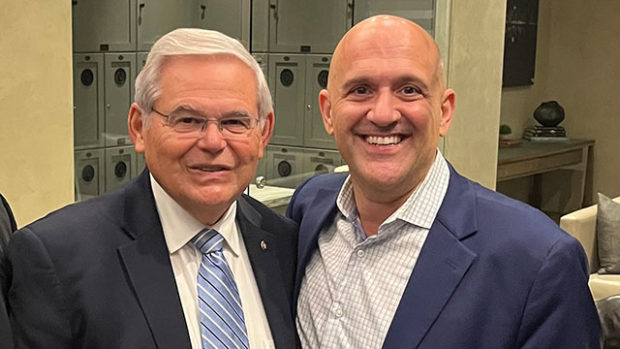
Zemenides with Senator Bob Menendez in Chicago (November 2022)
So it was a reality check?
Yeah, I think part of it was an appreciation that the Americans were somewhat of a bulwark to Germany’s punishment. I think at some point it was clear that (German finance minister) Wolfgang Schauble just wanted to punish Greece to make an example of it. Whereas (US Treasury secretary) Jack Lew did not have that mentality. The Congress did not have that mentality. Joe Biden, Barack Obama, none of them had that mentality, whereas the European finance ministers did. So I think part of it was an appreciation of that. And part of it was, okay, what can we do? Can these guys help us avoid some of the worst measures from the IMF, can these guys help us attract additional investment. Can these guys keep us safe?
How did Greek Americans and the Greek lobby help?
Listen, I remember, because I was there, this famous White House meeting in the summer of 2015, where you had the chief of staff of the White House, the national security advisor, the vice President of the United States. Biden spent two hours with us. Not that that meeting produced any single idea, but when you have the entire U.S. government, the top level of the government, being focused on a problem, because they know they have to answer to people who know they have a relationship with, you’re going to get better results.
What was the result?
Remember how many countries had an economic crisis that year. No other country but Greece got a summit in Congress. And nothing specific came out of that Congress, but it motivated a lot of members of Congress to find something later on. So, yes, I think the influence of the Greek community, and really the good reputation, not only the influence of the lobby, but the good reputation of the community, resulted in people stepping up.
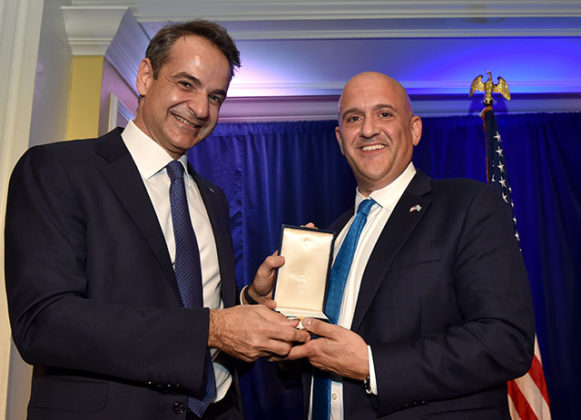
Zemenides receiving the Insignia of the Commander of the Order of the Phoenix from Prime Minister Mitsotakis (May 2022)
So what is the state of Greece right now? Has it recovered from the economic crisis?
Well, you know, there’s a slogan: Greece is back. And some people think it’s a slogan, but if somebody told you in the summer of 2015 that Greece would be out of out of the IMF memorandum, you would say no way. If somebody told you in 2015 that Greece was gonna be leading the Euro zone in growth, after a second economic crisis–let’s remember it got out of the adjustment in 2019, and then in 2020 Corona hit–that Greece would be leading the Euro’s own in growth, you would have laughed out loud.
How did Greece do it?
One, I think the Greek society as a whole proved its resilience. For better or worse, there was no ability for somebody to come in and try a short-term solution. So whether discipline was forced upon them, or whether they chose discipline, Greek society became more disciplined.
How do you change something baked into the system for generations?
The Greek people and the Greek state had a client relationship. That stopped with the IMF memorandum. There is no more, I’m voting for the state so I get a job promised to me, anymore. The extreme shrinking of the public sector, and the fact that a lot of this was coming through Europe, that client relationship that the Greek voters had with Greek parties disappeared almost overnight.
That’s pretty revolutionary.
Now you can sit here and say, well, there are still companies, there are certain rich groups, who benefit more from Nea Demokratia (center right, now in government), or benefit more if SYRIZA is in power. Yeah, but it’s not society-wide, as it once was. People were literally voting because, I got you your job, or I took care of your perousia, or so forth and so on. Well, that’s not the case anymore.
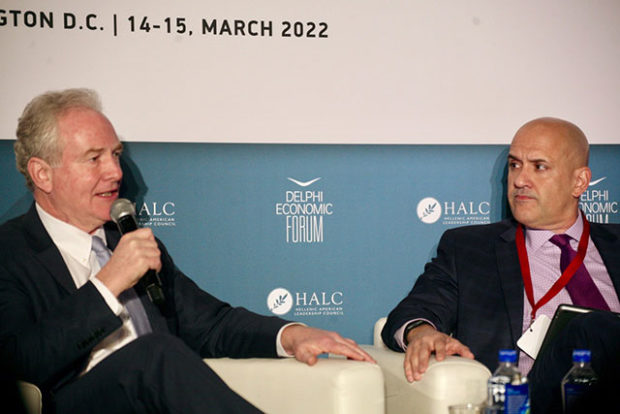
Zemenides interviewing Senator Chris Van Hollen at the “Southeast Europe and Eastern Mediterranean Forum” hosted by Kathimerini, HALC and the Delphi Economic Forum (March 2022)
So how do Greek politicians get elected now?
Well, a lot of the same as before. Look at our economic growth. Look at the investments we attracted. And it’s tangible progress. In 2015, we thought it was a big deal of if we found a rich Greek American to open up a small bed and breakfast in Greece. That’s not inconsequential, but compare that to what we’ve seen the last four years. Pfizer, Microsoft, JP Morgan, movie studios all investing in Greece. The biggest investments in the region, and southeast Europe, the biggest American investments in Southeast Europe, are all in Greece.
Because?
Well, one, because Greece proved itself stable. Stable enough. Greece showed enough political stability and economic stability that it was worth the investment. Two, the region around Greece—where some of the other investments were going, for example, Turkey, that was not a good bet anymore, for many reasons. Most of all, rule of law. The more Turkey slid towards authoritarianism, the less of a good bet it was for Western companies.
And one investment creates more…
And once a Pfizer comes in, it becomes easier for a Microsoft. When Pfizer and Microsoft come in, it’s easier for JP Morgan. And the process becomes streamlined and more efficient. How to get approvals faster, how to do more incentives, how to do taxes, to structure taxes better, how to get a better workforce, how to build infrastructure, how to privatize the right things. So there’s been a sea change in Greece.
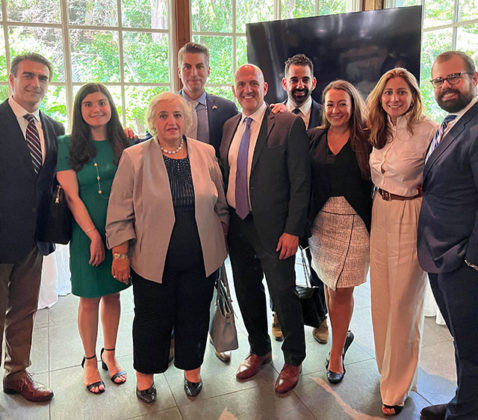
HALC members with Ambassador Alexandra Papadopoulou: Andreas Akaras, Laura Zervoudakis, Greek Ambassador Alexandra Papadopoulou, HALC Vice Chairman Tasos Pardalis, Endy Zemenides, Stathis Theodoropoulos, Katerina Dimitratos, Eleni Delimpaltadaki, Orion Karagiannis (at luncheon in honor of PM Mitsotakis, September 2022)
What about Cyprus? What is the state of Cyprus? Any progress?
Listen, I think a lot of progress. People will disagree with me, but I’ll tell you why I think a lot of progress. Cyprus is no longer going to be held hostage by Turkey. There is not progress towards reunifying Cyprus. But I always thought that the lack of progress is because Turkey was able to say, Cyprus won’t get into, for example, the EU unless it makes us happy. Cyprus won’t get into NATO. Cyprus won’t be part of a larger region.
Now that the Eastern Mediterranean is becoming a world again, Cyprus is becoming more important. Cyprus is playing a role in the European Union. Cyprus is playing a role in the Trilaterals with Greece: with Greece and Israel, with Greece and Egypt, with Greece and Jordan. Cyprus is a founding member of the East Med Gas Forum. And as I’ve always said to American officials, work on the bilateral relationship with Cyprus, and good things can come from there. If Turkey knows Cyprus is going to keep moving ahead while it’s being left behind, they’re going to be more incentivized to make a deal.
What is the state of the relationship with Greece and Turkey right now?
To say it’s difficult is an understatement. I have to say that there’s more danger now than we’ve probably ever lived through. First of all, because of Erdogan. This guy has an ambition. Some people call it “neottomanism”. There is no question with Turkey’s centennial next year he wants to be known in a hundred years as more consequential than even Ataturk.
The Putin syndrome?
And this is something that, unfortunately, I think the United States and Europe were a little complicit in promoting for years. We kept feeding Erdogan the idea that Turkey is the most important country in the region. And it fed his ambitions and grievances that the West was interfering in its affairs and rightful claims to sovereignty. You see how Turkey treats the Aegean and Eastern Mediterranean, that it rightfully belongs to Turkey. Turkey sees itself as a global power: Erdogan came to the UN and said there should be more than five members in the Security Council and Turkey should be one of them.
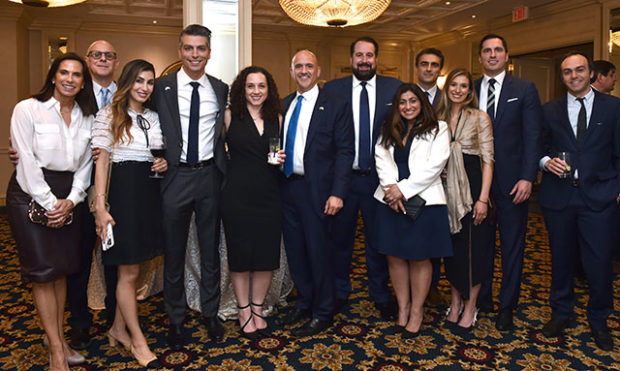
HALC members: Lorrie and George Marks, Maria and Tasos Pardalis, Vicky and Endy Zemenides, Michael and Aleka Dovellos, Andreas Akaras, Demetra and Loukas Kozonis, Harris Mylonas (at dinner in honor PM Mitsotakis May 2022)
And Greece is an obstacle?
He sees Greece not only as an obstacle, but as part of a conspiracy against him. He doesn’t see Greece as a world power that he’s fighting against. He sees America as a world power that he’s fighting against. And Greece is one of the tools, one of the tools that America uses. And Erdogan resents it: this year the amount of violations to Greek air space was record breaking. Erdogan’s air force violated Greek airspace 42 times in a single day. In a single day!
Why the escalation?
What set off Erdogan is the fact that the U.S. at the end of last year signed a new mutual defense and cooperation agreement with Greece, invested in the security relationship with Greece, and basically said, you know what, our major base in the region is gonna be Alexandroupolis. What was one of the first things that Turkey did in the Ukraine invasion: they closed the Dardanelles. But not only to Russia. To both sides. So you could say, well, it prevented Russia from doing stuff. Yeah. But theoretically it also prevented us from arming Ukraine. But now Americans can land ships and land weapons at Alexandroupolis, and truck them through Bulgaria, Rumania, and into Southern Ukraine.
Turkey’s primacy feels threatened?
Greece’s very existence, complicates Turkey’s ability to exercise prime power. Turkey says, I’m the biggest player in the region. That’s true. They’re the biggest economy, the biggest population. But that’s only if you are one country with one country. When you start looking at the alliances and the partnerships being built in Eastern Mediterranean, and you think of Greece plus Cyprus, plus Israel, plus Egypt, those four countries have been working very closely together. Now all of a sudden you have more population in Turkey, you have a bigger military in Turkey, you have a bigger economy in Turkey, but not if you match it up against an alliance of these four other countries.
The greatest level of a cooperation is now happening without Turkey at the table. You have the East Med Gas Forum. Guess who’s not a member of the East Med Gas forum—Turkey. You have the Abraham Accords happening. Guess who’s not a member? Turkey. You have new defense agreements within NATO. The MDCA with U.S. and Greece. Guess who’s not part of that? Turkey. You have the expansion of the EU in the western Balkans. Guess who’s not part of that? Turkey. So Erdogan overplayed his hand. He had a very good hand and he played it very badly. And now he’s reacting.
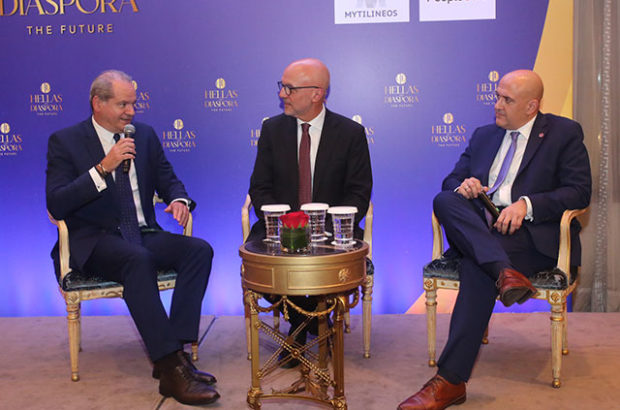
Kathimerini’s Tom Ellis interviewing American Jewish Committee CEO, former Congressman Ted Deutch, and Endy Zemenides at the “Hellas and the Diaspora: The Future” dinner (December 2022)
You said your parents came from Cyprus?
My father was from Cyprus. My mom was from Filiatra, right near Kalamata. My father who passed was Dimitri. My mom, who is still alive, is Irene. My parents came to Chicago and both went to the School of Architecture, at the University of Illinois. They met, they got married, I was born in Chicago, February of ‘73, in July of ‘73 we moved to Cyprus, in July of ‘74 the invasion happened. So me and my mom, who was pregnant with my brother, were evacuated with other American citizens. We were expelled from our home and evacuated. My dad, even though he was an American citizen, stayed and fought. And we were reunited in December of ‘74 in Chicago.
And you were raised in Chicago?
I was raised in Chicago. I went to DePaul University. I did six-month foreign study in Greece, in Athens. A singular life-influencing moment.
You also studied abroad?
I did a master’s at the University of Essex in the United Kingdom, in international human rights. I came back to the States after completing my master’s, I worked at a think tank called the National Strategy Forum. Then I went to Georgetown Law School. And then I came back and practiced law in Chicago and dabbled in politics. And then at some point the politics took over.
Tell me about the HALC: Is it a think tank? Is it a lobbying group?
I think it’s a public advocacy and education institute organization. But since you used the word think tank, it’s actually a think-and-do tank. First of all, to deal with a lot of the challenges that our community faces, the Hellenic world faces, we face as American citizens, you gotta be part of the discussion leaders are having. You can’t win just one lobbying effort: you have to really affect conventional wisdom: we wanted people to start talking about the Eastern Mediterranean. Years ago, nobody talked about the Eastern Mediterranean. But you know what? Everybody’s talking about the Eastern Mediterranean now. The State Department now has an Eastern Mediterranean strategy. Think tanks have Eastern Mediterranean studies. There are laws that have Eastern Mediterranean in the title: the Eastern Mediterranean Security and Energy Partnership Act, or the East Med One, and the US Greece Defense Interparliamentary Partnership Act, which is actually known as East Med Two. We work at the think tank level with think tankers, not only politicians, with think tankers, policy leaders, journalists, academics, to create this conceptual framework by which a lot of our lobbying made sense. So that’s how we put the think and the do together.
And your approach has changed?
Congressman Sarbanes actually talked about that shift. It used to be known that the Hellenic advocacy agenda was always against something. Against Turkey’s division of Cyprus, against Turkey, against what Scoje was doing: we were always defined in opposition to something. Now, we still have the same positions on the occupation of Cyprus, of the Aegean, but now we are able to flip the definition as a positive agenda, as a proactive agenda. Greece and Cyprus are at the center. The East Med revolves around the Hellenic states and Israel, let’s say, that partnership, and we’re going to build off of that. Those two acts I referred you to, and the policies that I referred you to, are based around Greece, Cyprus and Israel.
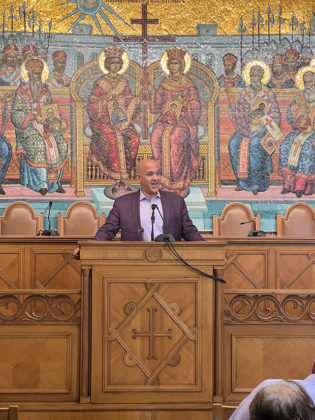
Zemenides addressing the Philos Project’s “Abraham’s Missing Child Initiative” in Greece (October 2022)
And HALC efforts closer to home?
We’re always talking about how can we connect the next generation of Greek Americans closer to Greece. And our answer was, let’s get more people to do foreign study. Let’s get younger people to have this life-forming experience, not just for a summer, let them learn that Greece is not just paralia and horio.
How do you do that?
Well, one of the things that we’re doing is we have started a pilot program with one of the excellent foreign study institutions, for a college year in Athens. So people can get introduced to those programs via online education. There’s a lot of scholarship funds for Greek Americans. So we’re not going to create our own scholarships. But we’re gonna work to raise money to send kids, specifically for foreign study. It costs another $5,000 or $10,000 for you to do six months in Greece? We’re gonna provide that.
Where is the HALC based and who is involved?
Chicago and Washington. We have five full-time employees and thousands of paid members. We have people on our list from all 50 states and 10-15 countries. We have people who have served in government and gone back in government. At one point the chairman of our organization was Alexi Giannoulias, and he got elected Illinois Secretary of State. While he was chairman, the vice chairman was George Tunis, who is now the ambassador to Greece. The present chairman of the board is Dr. George Chiampis, who’s the medical director of US soccer. We have a board of people who care about their Greek identity. They care about Greece, they care about America, they care about the bilateral relationship, and they care about issues that ten years ago people told me the next generation was not going to care about.
Where do you see the organization in ten years?
The program I’m very, very proud of and that is going to define us is actually named after Nikos Mouyiaris and is supported by the Niarchos Foundation. It’s the Nikos Mouyiaris Leadership 2030 program, where we recruit these young Greek Americans and we put them under a mentorship program. We put them in rooms where they sit in with Greek ministers, with senators, with diplomats, many of them have been in top secret briefings. But the reason we call it 2030 is by the year 2030 we want to have a couple, hundred kids through this program. And these couple of hundred kids will have had, by that time experiences that people who are 70 today have never had. They will have had a track record. And most importantly, they will have each other. So wait till 2030. Watch these kids by 2030. You may see them as vice presidents and presidents and CEOs of companies. I think we’re building a good class of committed leaders, civic leaders, Hellenic leaders.















0 comments